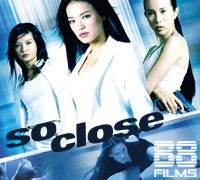AKA: 7 Samurai
Director: Akira Kurosawa
Cast: Toshiro Mifune, Takashi Shimura, Daisuke Kato, Isao Kimura, Minoru Chiaki, Seiji Miyaguchi, Yoshio Inaba, Kamatari Fujiwara, Bokuzen Hidari
Running Time: 207 min.
By Numskull
Akira Kurosawa is what I refer to as a “sacred cow” director (others include Ingmar Bergman and Wong Kar Wai). To suggest that any of his films is anything less than perfect in every way is to be labeled a blasphemer by all sorts of people. People generally being untrustworthy and despicable creatures, this is of no consequence to one such as myself, and it is without apology that I consider this film to be… well, actually it’s very good, but still overrated.
This three and a half hour tale of desperate farmers recruiting wandering samurai warriors to protect them from (a.k.a. “annihilate”) a band of forty marauding bandits has a scope and sense of heart and soul that few modern films can hope to match in spite of (or perhaps because of) its fairly straightforward storyline. Though its length is staggering, it does not suffer from excessive pacing problems or any significant amount of sheer monotony. Still, it definitely FEELS like three and a half hours. The film is interesting enough to draw you in and make you feel like a part of the world in which it takes place (you may even believe that life really was black & white back then), but you may get a bit more anxious to leave than it would like you to as the conclusion inches ever closer.
Our dauntless heroes: Kambei, the wizened tactician (Takashi Shimura); Shichijori, his old right hand man (Daisuke Kato); Heihachi, the jesting vagabond (Minoru Chiaki); Kyuzo, the consummate swordsman (Seiji Miyaguchi); Gorobei, the impulsive well-wisher (Yoshio Inaba); Katsushiro, the idealistic youngster (Isao Kimura); and Kikuchiyo, the temperamental wild card (scene-stealing Toshiro Mifune). Their nefarious adversaries: …… uh…… um….. a bunch of….. well…. a bunch of, um, bad guys.
The best antagonists are always the ones with names, faces, and memorable lines and deeds. The bandits in Seven Samurai have none of these things… well, OK, I guess they have faces on their skulls, but there’s still nothing distinct about them (the bandits, not the faces). Rather than existing as a collection of individual characters, the bandits are a collective plot device. Aside from the film’s very first scene, there are no segments that present their perspective or illustrate their reactions to the heroes’ attempts to thwart them (except when the two factions are face to face). Of course, this is not a generic good guys vs. bad guys story, and, considering the length of the film, an argument could be made against more spotlight for the villains as this would only make the movie longer to the point of insufferability. But, considering how much time is spent recruiting the samurai and then getting them to the soon-to-be-besieged village, I think the film would have been better off if Kurosawa had cut back on the philosophy-laden dialogue and presented the additional point of view. On the other hand, philosophy-laden dialogue IS one of the things that makes a Kurosawa film a Kurosawa film. There’s no easy answer. I’ll just shut up about this whole issue.
Another related problem is character exposition for the samurai. For the most part, these guys aren’t exactly bursting with personality. Kambei probably has the most screen time, Kikuchiyo is obviously Kurosawa’s favorite, and Katsushiro is involved in one subplot too many. Gorobei, Heihachi, and Shichijori get somewhat shafted in the spotlight department while Kyuzo hovers between the two degrees of exhibition. This is not to say, however, that our septet of brave warriors don’t have good chemistry together. They do. Kurosawa assembled a cast that seems to have a great sense of camaraderie, and that translates well to the screen.
The second half of the film is more involving than the first and is where the majority of the action takes place. By “action” I mean stuff happening, not just fighting, although there is a small amount of that, all of it brief and about as “un-flashy” as can be, for which it is all the more realistic. These scenes are largely devoid of the sound effects typically associated with scenes of swordplay.
If you have yet to see Seven Samurai, don’t watch the trailer first as it reveals things it shouldn’t (and also promises “A FLAMING LOVE IN THE SHADOW OF DEATH!” Um…yeah). I stand by my belief that this film is not God’s gift to cinema, but nevertheless it fully deserves much of the praise that has been heaped upon it and didn’t spark a transcultural remake (The Magnificent Seven) by accident. It is a standard bearer, if nothing else. So be it.
Numskull’s Rating: 7/10




